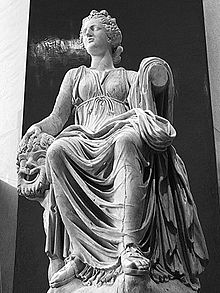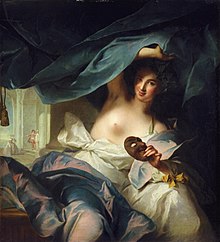Thalia (Muse)

Thalia (/θəˈlaɪə/[1][2] or /ˈθeɪliə/;[3] Ancient Greek: Θάλεια; "the joyous, the flourishing", from Ancient Greek: θάλλειν, thállein; "to flourish, to be verdant"), also spelled Thaleia, was the goddess who presided over comedy and idyllic poetry. In this context her name means "flourishing", because the praises in her songs flourish through time. She was the daughter of Zeus and Mnemosyne, the eighth-born of the nine Muses.
According to pseudo-Apollodorus, she and Apollo were the parents of the Corybantes.[4] Other ancient sources, however, gave the Corybantes different parents.[5]
She was portrayed as a young woman with a joyous air, crowned with ivy, wearing boots and holding a comic mask in her hand. Many of her statues also hold a bugle and a trumpet (both used to support the actors' voices in ancient comedy), or occasionally a shepherd's staff or a wreath of ivy.
See also[edit]
Notes[edit]
- ^ "Thalia". Oxford English Dictionary (3rd ed.). Oxford University Press. September 2005. (Subscription or UK public library membership required.)
- ^ https://www.merriam-webster.com/dictionary/Thalia
- ^ http://www.oed.com/view/Entry/200089
- ^ Apollodorus, Bibliotheca, 1.3.4.
- ^ Sir James Frazer's note on the passage in the Bibliotheca.
References[edit]
- Grimal, Pierre, The Dictionary of Classical Mythology, Wiley-Blackwell, 1996, ISBN 978-0-631-20102-1. "Thalia" 1. p. 442.
- Smith, William; Dictionary of Greek and Roman Biography and Mythology, London (1873). "Thaleia" 1.
External links[edit]
 Media related to Thalia at Wikimedia Commons
Media related to Thalia at Wikimedia Commons- Warburg Institute Iconographic Database (ca 40 images of Thalia)

